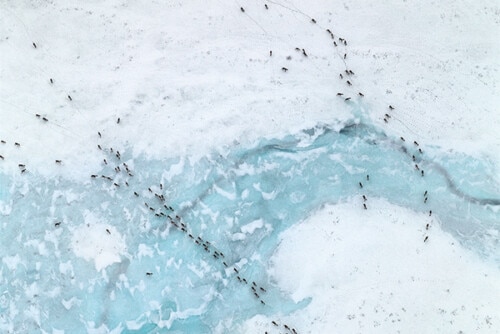Barnard Alum Lisa Rand (’05) interviewed Daryl Xavier, who returned to school in her late forties to work on a PhD in Antarctica. The following article is based on their interview.
Daryl Xavier sustained a nasty knee injury after taking some bumps while riding an all-terrain vehicle over an icy landscape. Her young adult children tell friends that their fifty-year-old mother wiped out while joyriding on a glacier. In reality, Daryl Xavier’s accident took place while returning from a research trip to Pendant Lake, one of three saline lakes she studied in the Vestfold Hills region of Antarctica. After thinking of their mother as a stay-at-home mom their entire lives, it is difficult for Xavier’s children to imagine that their middle-aged mother wintered at Davis Research Station in Antarctica to study halophilic bacterioplankton.

Xavier credits her children as the reason she traveled to Antarctica, and why she began her course of study in microbiology in the first place. Xavier’s career path did not originally include plans to study microbial communities in extreme environments. She initially studied human nutrition, receiving her diploma from Leeds Polytechnic University (now Leeds Metropolitan University) in 1979 and working as a dietician. Soon after she married and had children, her partner’s job took the family abroad to the U.S.. The move to Connecticut left Xavier without a work visa, so she spent the following 15 years as a stay-at-home mother, volunteering as a Sunday school teacher and Girl Scout Troop leader. Xavier does not regret the time she spent as a full-time mother. “I have always been the primary care giver to my children,” says Xavier. “I truly believe it is the most important job a mother can have.” In 1996, Xavier moved back to England with her two children, with the expectation that her husband would join them once the children assimilated to English life.
In 1999, after her marriage dissolved, Xavier suddenly found herself a single parent, and the option of being a stay-at-home mother became a luxury that she could no longer afford. By this time, her children were far enough along in school to no longer require her regular supervision, so Xavier pursued further education courses in hopes of making herself more attractive to prospective employers. She enrolled in coursework relevant to her previous career, receiving an AS degree in human biology, with extra credits toward the Women Into Science program sponsored by Coventry University. Microorganisms had interested Xavier when she was a teenager, so she decided to combine this longstanding interest with her existing background in nutrition by pursing a bachelor’s degree in food microbiology at Nottingham University, graduating in 2004 at the same time that her son graduated from university with a pre-medical degree.
A graduate program was not part of Xavier’s initial plans, given her goal to return to the workforce. However, her children encouraged her to look into programs that would afford her interesting research experiences. When she learned of the possibility of conducting research at the Davis research station in eastern Antarctica, Xavier jumped at the chance to do something strange and wonderful.


